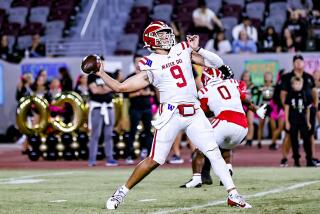At San Diego State, Coach Has a Good Reason to Play It by Book
- Share via
SAN DIEGO — The unusual has become the usual at San Diego State.
For instance, the football coach has $10,000 withheld from his paycheck annually. He collects if the program stays off probation.
The fans are also on an incentive program. Season-ticket holders were given a money-back guarantee if they didn’t enjoy the home opener.
Coaches from every program are required to sell football season tickets. It certainly seems as if San Diego State is playing this season seriously.
San Diego State had four athletic directors in six years before Fred Miller was hired last December. Its football team, which is 2-0 this year and plays host to UCLA Saturday night, has had three consecutive losing seasons for the first time in 26 years.
Miller came in talking about establishing credibility. He has attempted to gain community trust through unusual ideas.
Shortly after Miller was hired, he hired Denny Stolz to coach football. Shortly after Stolz signed a five-year contract, Miller revealed the $10,000 incentive to run a clean program.
“I want those incentives for running a program by the book,” Miller said. “If there is a violation, all of that money is donated to our scholarship fund. This is an intensive situation. When I sent out the memo, it certainly got the attention of our primary sports.”
When Stolz signed the contract last December, he did so with little reservation.
“I find nothing wrong with it,” he said at the time. “I need to talk more about it. We discussed it briefly during my interview, and I had no objections to it.”
Earlier this week, Stolz declined to comment on the contract.
Stolz has a 111-74-2 career record at Alma College, Michigan State, Bowling Green and San Diego State. He was the Big 10 Coach of the Year in 1974, and he led Bowling Green to a 14-game winning streak before losing to Fresno State, 51-7, in last year’s California Bowl.
In 1975, shortly after Stolz signed a three-year contract extension with Michigan State, the Spartans were placed on probation by the National Collegiate Athletic Assn. Stolz negotiated a resignation.
“We’re not jousting up old shadows,” Miller said of Stolz’s $10,000 incentive. “Our program is based on prevention, rather than punishment. I don’t want those mistakes to happen. If we approach this with a vigil, we shouldn’t have those problems.”
San Diego State had football attendance problems last season, averaging 19,485 fans in 60,000-seat San Diego Jack Murphy Stadium. The Aztecs drew 10,876 and 10,343 for their final home games against Texas El Paso and New Mexico.
Thus, Miller designed the season-ticket marketing program that involved coaches, athletes and boosters. Each San Diego State athletic team made phone solicitations to former season-ticket holders and alumni. For every season ticket sold, the particular team received a 25% commission. If the new season-ticket holders renew, the designated team gets 20% commission the second year and 15% commission thereafter. With budgets frozen for 1986-87, teams could increase their revenues only by selling football season tickets.
“It was so radical at first that there was some reluctance,” said Jim Herrick, assistant athletic director for marketing and promotions. “People did warm up to it. I told them I’m not going away, and the concept is not going away. When you make a call that makes $100 for your program, you don’t mind doing it.”
The phone solicitations resulted in 647 season ticket sales, grossing $35,274. San Diego State’s various sports netted $8,818.50, or 25% of the sales. Football led season ticket sales with 145, netting $2,217. Baseball was second with 95 sales. Some weren’t as fortunate. Women’s tennis and men’s golf sold four season tickets, and women’s basketball sold two.
Jim Dietz, baseball coach, said the ticket sales enabled his team to have the maximum 13 scholarships in 1986. His team netted $930.
“After the season is over, you’re burned out,” Dietz said. “It’s hard to be as involved (in football ticket sales) as we would like to be. But this certainly has merit to it.”
There were some that netted little from the ticket sales. Men’s golf made $72, women’s tennis $60 and women’s basketball $36.
Miller gave the first-year program a grade of C-plus.
“Season tickets are a hard sell in this town,” Miller said. “I didn’t realize the resistance there would be in the community. The only way we could stretch our athletic budget was through football season-ticket sales. How else are volleyball or tennis going to make money? If a coach says they’re not hired to do this, they can’t expand their program. If they can’t expand their program, they won’t be successful.”
Miller’s money-back guarantee proved to be a successful risk. After the Aztecs opened Sept. 6 by beating Cal State Long Beach, 27-24, only one of 11,980 season-ticket holders asked for a refund.
The fan told Vickie Larsen, San Diego State ticket manager, he did not enjoy the game. Saturday, the Aztecs will provide a different seat location for the fan. “Quite frankly, I might want to see him in my box at the next home game,” Miller said. “I don’t want to lose the one.”
Miller stood to lose a lot more than one fan when San Diego State trailed Long Beach, 14-0.
“Yes, it was risky,” Miller said. “In an attempt to jolt the community, I had to make major college football maybe larger than what it is. I believe in calculated risks. When we were down, 14-0, I thought the risk might not have been too calculated.”
More to Read
Go beyond the scoreboard
Get the latest on L.A.'s teams in the daily Sports Report newsletter.
You may occasionally receive promotional content from the Los Angeles Times.






